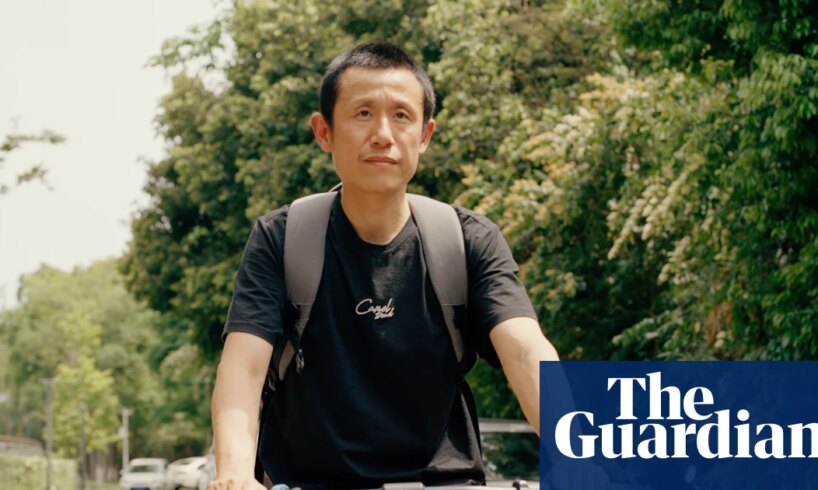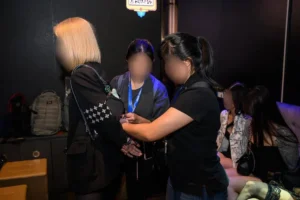
Hu Anyan is not a fan of online shopping, but, as he discovered during the months he spent as a courier in Beijing, plenty of people are. Not long into the job, he was assigned to delivering parcels to a large construction site. He didn’t have to deliver that many – 10 to 20, most days – but getting them to their rightful owners wasn’t always easy. There was a crane driver who was often in the air when Hu arrived. He would ask him to come again the next day, only to be found in the sky again.
“In the end,” Hu writes in his memoir, I Deliver Parcels in Beijing – which is being published in English for the first time this month – “it would take several trips” to deliver this man his parcel. “But this didn’t dampen his passion for online shopping.” As a courier, Hu had to work to an exacting schedule, making a delivery every four minutes so as not to run at a loss. Couriers were paid 1.6 yuan, the equivalent of 17p, for every parcel they delivered, but the task was much more involved than that of couriers in the UK. He sometimes had to wait while people tried things on and then repackaged rejected items on the spot. Plus, he had to pay compensation for every parcel that went missing.
No matter what job I did, I didn’t achieve anything and I couldn’t do it for long. Then I kept covering up the pain
He soon worked out that “if a minute was worth 0.5 yuan, then the cost of urination was 1 yuan”. Eating lunch, he calculated, needed 20 minutes, which would cost 10 yuan. “Basically, I skipped a lot of lunches,” he recalls in his memoir. “I also hardly drank any water in the mornings to reduce the frequency of restroom breaks.” Over a video call from his apartment in Chengdu, the capital of Sichuan province in south-west China, Hu elaborates: “No matter what job I did, I didn’t achieve anything and I couldn’t do it for long. Then I kept covering up the pain, which made me worry about my own self-worth.”
The memoir, which was first published in China in April 2023 and quickly became a national bestseller, charts Hu’s stint as a courier from March 2018 until November 2019, but it also lifts the lid on the overwork and financial precarity that underpinned the innumerable other jobs he has done throughout his adult life. Still only 47, he has had 19 jobs across 20 years, all over the country – though the tally is higher still if you count the even more informal gigs he did in between.
In Guangdong, Hu unpacked and packed parcels from seven in the evening until seven in the morning. Photograph: Comezora/Getty Images
Hu has sold bicycles in Shanghai, working China’s common 996 shift pattern – from nine in the morning to nine at night, six days a week – though the shop often closed later (monthly salary: 3,000 yuan; £313). He has worked the night shift in a logistics factory in Guangdong, in southern China, unpacking and packing parcels from seven in the evening until seven in the morning, with a half-hour break for dinner. Baking in the heat, he would drink three litres of water each shift – but he sweated so much that he never once needed to pee (top performers were paid 5,000 yuan a month; £522). He has been an apprentice at a bakery and at a comic book publisher. He has run a women’s clothing store at a mall in the southern city of Nanning, and a deli in a remote, rural town in Yunnan. He has been a gas station attendant, a graphic designer and an ice lolly wholesaler. He has worked at companies making 3D architectural renderings, rear-view car cameras and business cards. He has been in “property management” at a mall in Dali City, also in Yunnan province – “which is”, he says, “another way of saying I was a security guard”.
The ordinary details of these jobs – their gruelling demands, the petty bureaucracy, the brief moments of humanity amid the overwhelming pressure – are narrated in unadorned, sincere prose, which is perhaps why the book earned such praise upon publication in China. Its unsparing depiction of the realities of life in the gig economy sparked debate about contemporary work culture.
The interest in his book came in different waves and forms, Hu says. First, there were readers interested in the lives of workers who they saw everywhere but who were rarely given a voice: night shift staff, storekeepers and couriers. But then, as word of mouth spread, people beyond these silenced workers began to see their own doubts and confusion about the working world reflected in Hu’s writing.
Has his book led to calls to improve working conditions for gig workers? That’s a complex issue beyond the power of an ordinary reader in China, Hu says, and a matter for the government and industry. But he does say that, after reading the book: “Many readers say they will be more tolerant, patient and understanding towards couriers. They will no longer be so demanding or strict.”
To read his memoir is to get a sense of the vast transformation that has taken place in China in the past century. Born in 1979, Hu grew up in Guangzhou, a major city in south China. His parents’ formative years were during Maoist China: his mother was sent to the countryside during the Cultural Revolution, and his father joined the People’s Liberation army at 16. They would later work, as was customary then, in the same workplaces their whole lives. The itinerant life of their son, and millions of others like him – hopping from one insecure gig to another – was incomprehensible to them.
A bus driver in Guangzhou. Photograph: SOPA Images/LightRocket/Getty Images
Growing up, Hu “had no idea” what he would do later on. He studied home appliance repair at his vocational secondary school, and later got a degree in advertising design at night school. Last time he checked, only one person out of about 40 in his secondary school cohort wound up working in appliance repair. The others got whatever they could through personal connections after graduation in 1999: “Some people sold seafood; some drove long-distance buses.”
“In China, it is very common for people to take 20 to 30 jobs within 20 years,” he says, referring in particular to those who do the kind of work “that has no room for advancement, no professional skills required”. In this precarious life, it’s easy to quit, and easy to find something new. In Hu’s own experience, most of his jobs came to an end when he got burnt out, frustrated or bored – the riches that were promised didn’t materialise and the grind became too much.
He enjoyed his apprenticeship at the bakery and assisting at the bike shop the most: “You learn new things and master new knowledge. You feel you are gaining growth and progress.” In comparison, as a courier: “You deliver a package on your first day of work, and you deliver a package on your last day of work. You might learn to deliver things a little bit quicker in between, but there is not much difference.” He remembers growing “irritable, grumpy, resentful” as he began to see the customers “as more selfish, unreasonable and greedy than they really were”.
I Deliver Parcels in Beijing is, among other things, a story about social class: about the unacknowledged and often exploited low-paid labour force that has powered the economic boom in China – and, given globalisation, the world. Hu often worked alongside the country’s nearly 300 million-strong group of internal migrant workers, people who move from the countryside to the cities in search of better opportunities. They often face extreme insecurity and discrimination, with limited access to public benefits.
Shanghai, where Hu had a gig selling bicycles. Photograph: Hans Neleman/Getty Images
A sense of scarcity and insecurity festered in many of his workplaces: when a pregnant woman joined his team at the packing factory, his colleague deemed it a “tragedy”. Once, competition between his women’s clothing store and another in the same mall ramped up so much that Hu smuggled a kitchen knife into work for protection. At a wholesale market where he did business at that time, “a business owner made a bomb and threw it at his competitor’s stall, blowing them up”.
This extreme environment makes some sense when you consider the state of the nation at the turn of the century. By the late 90s, when Hu joined the working world, he recalls that liberal economic reforms suddenly made it possible for new swathes of society to make money. A frenzy of competition fed into a culture of doing what you could – legally and illegally – to get rich; while government regulation struggled to keep up. “There was a saying in the 1990s: ‘The timid will die of not making enough [money]; the bold will die of making too much.’” At the time, Hu says: “Nine out of 10 people you met only cared about making money.”
Young people feel their confusions, worries and doubts can be comforted by my book
It was also at this time that Hu, then 30 and increasingly discouraged by his experiences at work, started writing. He began reading western literature, taking inspiration from JD Salinger, Raymond Carver and James Joyce, as well as posting on an online literary forum. Hu would usually write in the breaks between jobs, as work often left him too exhausted to do anything else. It was well over a decade, however, before he had a breakthrough: in 2020, a blogpost he wrote about life as a courier went viral, attracting the attention of the literary world. What made him keep going? “I didn’t feel that I needed to achieve something in writing,” he says – it was simply something that enriched his life.
Today, after the success of his book, Hu is a full-time writer, and has followed up his bestseller with two more autobiographical books. He’s quick to clarify that his earnings aren’t particularly large, and that he lives, as he always has, a frugal life. He and his wife – also a writer; they met on the literary forum – spend their days going to the library, or the shopping mall, where they write with the benefit of free wifi and air conditioning, before going home to cook dinner.
Though he and his wife don’t interact much with others – “We rarely socialise; we’re both very introverted” – they know the world around them has changed drastically from the boom years of the 00s. The economy has stagnated: China’s urban youth unemployment rate is nearing 20%, and there is a popular “lying flat” youth movement rejecting 996-style workaholism. Hu sees younger generations seeking more purpose in life beyond work or money, and his book has attracted graduates overwhelmed by the world of work. “They feel their confusions, worries and doubts can be comforted by my book,” he says. “They can’t get answers [from me], because I don’t have the answers, but they see that someone else also has these confusions and doubts, and they can find some warmth, encouragement and comfort from it.”
It strikes me that English language readers could read Hu’s book as an isolated account of a world over there, a story of an unfree and unjust life in a distant land. But that would do a disservice to his expansive and inclusive reflections on human dignity and freedom, at a time when work dominates life in general, and when many of the socioeconomic forces – the pressure, the inequality, and the way that global capitalism has a way of making a human feel like a thing – that shape his life also shape ours.
I tell him it’s relatively rare to hear an ordinary Chinese person’s voice at length in the west. China has an entirely different internet ecosystem, and censorship is rife, but although his memoir paints a fairly brutal portrait of work culture in China, government publications have praised the book for its depiction of the “self-control of ordinary people amid the hardships of labour”, lauding it as part of a broader wave of national “grassroots literature”. Hu hopes its translation will “promote two-way communication, so foreign readers can understand me and my environment. Then, in turn, I can introduce the situation of foreign readers to my domestic ones.”
It’s fitting that, in the spirit of cross-cultural exchange, his book ends with a reflection on Virginia Woolf and the Anglo-Irish poet Laetitia Pilkington, who lived an at times impoverished life. Hu notes that after Woolf had read Pilkington’s memoir, she had written: “All had been bitterness and struggle, except that she had loved Shakespeare, known Swift, and kept through all the shifts and shades of an adventurous career a gay spirit.”
“The first time I read this portrait of her, I was moved to tears,” Hu writes. “Love amid despair – this is the light that illuminates life.”
Additional research by Jason Tzu Kuan Lu.
I Deliver Parcels in Beijing is published by Allen Lane on 28 October (£20). To support the Guardian buy a copy at guardianbookshop.com. Delivery charges may apply.
Do you have an opinion on the issues raised in this article? If you would like to submit a response of up to 300 words by email to be considered for publication in our letters section, please click here.





